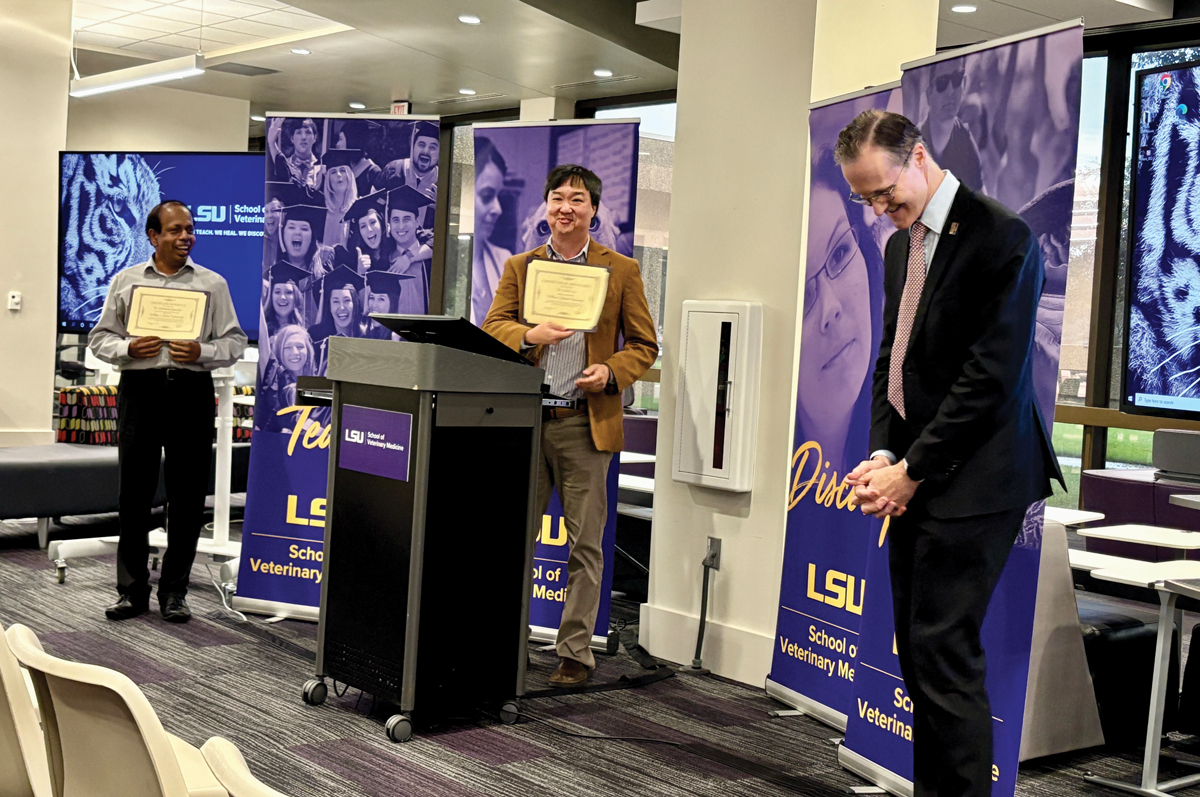CBS News and Announcements
August 2025
CBS Ph.D. student receives SfN award
Oluwamuyiwa "Anthony" Ayanshina, Ph.D. student in CBS, recently received a 2025 Trainee Professional Developmen Award from the Society for Neuroscience. This award includes a complimentary registration to Neuroscience 2025 in November 2025 in San Diego and online and one year of access to Neuronline, SfN's collection of professional development and training resources for neuroscientists at all career stages. Additionally, each recipient must present an abstract at Neuroscience 2025 and attend at least two professional development workshops.

Oluwamuyiwa "Anthony" Ayanshina
LSU Vet Med honors endowed professors whose work impacts animal and human health every day
The LSU School of Veterinary Medicine has named the newest recipients of its prestigious endowed professorships, five-year appointments that fuel groundbreaking research, innovative teaching, and improved care for animals and people. These positions provide faculty members with the resources to pursue discoveries that often translate directly into better diagnostics, treatments, and public health outcomes.
Endowed professorships support the work of accomplished scholars whose expertise ranges from developing better treatments for painful eye diseases in pets to creating faster diagnostic tests for life-threatening infections, to advancing neuroscience research that can help people with Alzheimer’s and PTSD. These professorships are effective July 1, 2025, through June 30, 2030.
“These professorships are more than academic honors,” said Oliver Garden, PhD, FHEA, FCPP, FRCVS, DACVIM, DECVIM-CA, dean of LSU Vet Med. “They are investments in science and medicine that make a tangible difference in the lives of families, pet owners, farmers, and communities in Louisiana and beyond.”

From left, Dr. Samithamby Jeyaseelan, Dr. Charles Lee, and Dean Oliver Garden at the 2025 Professorship Recognition Ceremony.
Dr. Mary Louise Martin Professorship – Olalekan (Michael) Ogundele, PhD
Dr. Ogundele is an associate professor and neuroscientist in the Department of Comparative Biomedical Sciences studying how the brain processes novelty and context—research that can inform treatment for anxiety disorders, learning challenges, and age-related cognitive decline in both animals and people. This professorship was founded in memory of Dr. Mary Louise Martin (LSU 1982), who moved to Africa in 1995 and lost her life in the terrorist bombing of the U.S. embassy in Nairobi on August 7, 1998. In 2022, Dr. Ogundele received a National Science Foundation grant to study neural circuits that govern novelty and context discrimination behavior and an NIH grant to investigate novelty encoding mechanisms in 2023. In recognition of his effort, he was named an LSU Distinguished Faculty (2024) and received the Zoetis Research Excellence Award (2024). “It’s an honor to have been selected for this professorship and will continue to embody the teaching and research excellence it represents,” said Dr. Ogundele.

Olalekan "Michael" Ogundele
William L. Jenkins Professorship – Charles Lee, PhD
Dr. Lee is a professor of cognitive and neural systems and expert in cognitive and neural systems in the Department of Comparative Biomedical Sciences whose work deepens understanding of brain function, with potential benefits for neurological disease research in humans and animals. This professorship was established in honor of William L. Jenkins, BVSc, M.Med.Vet, PhD, Professor Emeritus of veterinary physiology, pharmacology and LSU Vet Med Dean, and LSU Provost, LSU Chancellor, and President Emeritus for the LSU System. Dr. Jenkins served as the dean of LSU Vet MEd from 1988 to 1993. Said Dr. Lee, “I am truly honored and humbled to receive the William L. Jenkins Professorship in Veterinary Medicine. I am deeply grateful for this opportunity and will strive to live up to the trust it represents.”

Charles Lee
Dr. Alexandra Noël receives new NIH funding to study the effects of prenatal vaping exposures on pulmonary responses
In March 2025, Dr. Alexandra Noël, Associate Professor of Inhalation and Developmental
Toxicology in the Department of Comparative Biomedical Sciences (CBS), was awarded
a major federal grant, a R01. The five-year award, totaling over $2.2 million from
the National Heart, Lung, and Blood Institute (NHLBI), will support Dr. Noël’s innovative
research on the respiratory effects of prenatal exposures to electronic-cigarette
aerosols.
This important funding will allow Dr. Noël and her team to advance the scientific
understanding of how vaping during pregnancy affects lung development and contributes
to respiratory diseases. The project aims to uncover the mechanisms by which prenatal
exposures to electronic-cigarette aerosols impact lung development and increase the
susceptibility for chronic lung diseases, particularly asthma, with the potential
to inform future public health policy and prevention strategies.
Dr. Noël’s laboratory has maintained continuous NIH funding since 2018, and this latest
grant highlights both her significant contributions to the fields of inhalation toxicology
and vaping research, and her dedication to mentoring the next generation of scientists.
Overall, her research sheds light on the health impacts of emerging tobacco products.

Alexandra Noël
Dr. Ethan Anderson receives NIH R01 grant about chronic alcohol use and addiction
Ethan Anderson, Ph.D., Assistant Professor, was awarded a 5-year R01 grant from the National Institute on Alcohol Abuse and Alcoholism, a division of the National Institutes of Health (NIAAA/NIH). This award is for over $2 million and will fund basic science research in the Anderson Lab on how chronic alcohol use affects the brain using rodent models of addiction. The grant is called “Epigenetic regulation of stress-potentiated ethanol drinking.”

Ethan Anderson
May 2025
Dr. Ahmed Abdelmoneim receives grant to study lead exposure and noradrenergic regulation of acute stress response
In May 2025, Dr. Ahmed Abdelmoneim, Assistant Professor, received a $400,000 grant from the National Institute of Environmental Health Sciences, part of the National Institutes of Health, for his project entitled "Developmental exposure to lead and noradrenergic regulation of the acute stress response." The study leverages the zebrafish model to investigate the effects of developmental lead (Pb) exposure on a key regulator of the stress response, aiming to elucidate its contribution to Pb-induced stress behavioral phenotypes. Through genetic and pharmacological modulations, Dr. Abdelmoneim's lab intends to establish a causal link between noradrenergic signaling disruptions and behavioral changes induced by Pb, and to reveal structural and functional changes in the noradrenergic neurons of the locus coeruleus via transgenesis and in vivo brain imaging. Considering that stress-related psychiatric disorders affect a quarter of the global population, and environmental contaminant exposure is a significant yet underexplored risk factor, the research should provide valuable insights into the intersection of environmental toxicology and mental health. The project period is 2025-2027.

Ahmed Abdelmoneim
March 2025
CBS Ph.D. student awarded Neural Systems scholarship
CBS Ph.D. student, Ignitius Lim, has been awarded a scholarship for the Neural Systems training at the Marine Biological Laboratory (MBL). This course provides comprehensive training in modern methods for exploring the neural mechanisms related to behavior, perception, and cognition. Spanning eight weeks, it includes both laboratory and lecture formats and is designed for graduate students, postdoctoral researchers, as well as independent investigators. As many of you may know, the Marine Biological Laboratory serves as a global hub for research and education in biological and environmental sciences. Established in Woods Hole, Massachusetts, in 1888, MBL has trained over 63 Nobel Prize laureates, 137 Howard Hughes Medical Institute investigators, 319 members of the National Academy of Sciences, and 260 members of the American Academy of Arts and Sciences.

Ignitius Lim
CBS Ph.D. student elected to the SCCSOT Executive Committee
Melanie Wilson, Ph.D. candidate, was elected to the Executive Committee of the South Central Chapter of the Society of Toxicology as a graduate student representative. Newly elected board members start terms on May 1, 2025. SOT is a professional and scholarly organization of scientists dedicated to creating a safer and healthier world by advancing the science and increasing the impact of toxicology.

Melanie Wilson